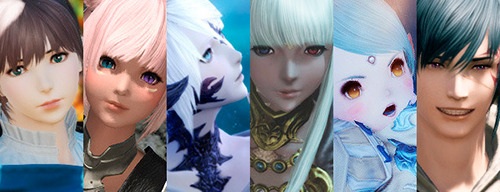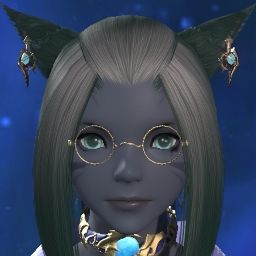-
07-12-2019 04:33 PM #101Player

- Join Date
- Nov 2017
- Posts
- 14,070
- Character
- Aurelie Moonsong
- World
- Bismarck
- Main Class
- Summoner Lv 90
(14)
-
07-12-2019 04:36 PM #102
...or maybe - and I'll admit that thats a very big maybe that I dont have that much evidence for after all, I'll freely admit that - maybe he wanted us to win, at least subconsciously. Police assisted suicide, so to speak, considering we're probably the only ones who can kill him.
I could see him being tired of all of this, after being pretty isolated (only two more of his kind left, and if I recall correctly he isnt exactly best buddies with at least Elidibus) for over a thousand years... even if his race is immortal I can not see that not having an effect on someones mind.
The whole time we was traveling with us, he claimed to look for signs that we're worth living, yet he tells himself (and us) that he cant find any, despite trying desperatly, testing us again and again. What if he did find those signs after all and realised that hes actually been killing some sort of life after all this whole time? And now hes just done with all of it - he might have even "groomed" us to be the one who finally slays him, guiding us to collect the amount of energy (=light of the wardens) that would be needed to accomplish that.
As I said - I know that this is very, very reaching and just one possible scenario and maybe not one that can be fully support with everything he said and did... but maybe he just wanted to die after feeling sort of alive before by battling an "equal" foe of his design who could actually kill him off. He must have known that there was at least the possibilty of that happening after we finished Lhabrea off and I could see him just aiming for that after thousand years of loneliness...
Very much specualtion, very much nothing I can pull a quote out of my hat to point at - but something I could see being at least part of the reason we won: He wanted us to.
Edit: Looking at his last lines of "Remember us", how he tells you a bunch of stuff about the Ascians and such during the story if you ask him and that he created Amarout for us to see and understand what was lost - maybe that was his solution in the end: Turning himself and his folk into a legend to live on that way...? Again, reaching and I'm not sure if he'd really be the character for that, but... maybe possible?(9)Last edited by Vidu; 07-12-2019 at 04:39 PM.
-
07-12-2019 04:48 PM #103Player

- Join Date
- Dec 2013
- Location
- Gridania
- Posts
- 1,134
- Character
- Clover Blake
- World
- Balmung
- Main Class
- Conjurer Lv 90
Hahahahaha, I also thought of Dragon Ball during that part! It made me feel a bit weird.
I think he should have won, not because his cause is the most just (I think both causes can be more or less good), but because he was supposed to be super powerful, but in the end it was just tons of flashy lights. I'd like to be able to take any enemy seriously.(0) http://clovermemories.tumblr.com/
http://clovermemories.tumblr.com/
-
07-12-2019 05:01 PM #104
I wouldn't say he was actually going for the suicide route, seeing the last cutscene where he pulls himself back from the brink of dissolving by sheer will and determination for his cause (whichafter we pepper him with auricite). He did say however that he's always testing the lesser races. It's possible that he fighting us, is the ultimate test given after we dragged ourselves to him after the last failed test, finished his illusionary dungeon of a world ending scenario, and making a somewhat convincing argument for our case? Something akin to newfound respect maybe?
He did say that given the choice he wouldn't fight us directly when we first met him.(0)Last edited by Lersayil; 07-12-2019 at 05:03 PM.
-
07-12-2019 05:17 PM #105
-
07-12-2019 05:17 PM #106Player

- Join Date
- Aug 2013
- Location
- Ul'dah
- Posts
- 373
- Character
- Shion Sumeragi
- World
- Gilgamesh
- Main Class
- Samurai Lv 80
It's as Emet Selch said.
"The one who wins will write history, and the loser shall be the villain!"
He lost.(10)
-
07-12-2019 05:22 PM #107Player

- Join Date
- Mar 2018
- Location
- London
- Posts
- 433
- Character
- Narukai Nephilim
- World
- Zodiark
- Main Class
- Black Mage Lv 90
I mean Zenos kinnda did he only went out after slitting his own throat...
(0)“We are all in the gutter, but some of us are looking at the stars.”
― Oscar Wilde
-
07-12-2019 06:03 PM #108Player

- Join Date
- Oct 2012
- Location
- Limsa
- Posts
- 488
- Character
- Elai Khatahdyn
- World
- Omega
- Main Class
- Scholar Lv 90
People seemed determined to see things as black and white.
There is little difference between either outcome since souls are doomed regardless, and the high moral ground belongs to the victor (in this case, us).
Zodiark remade the world; in order to do so he needed vast amount of aether so the souls willingly sacrificed themselves. Those who remained asked if he could restore the sacrifices, and he said yes but he required more aether. So in order to restore those they loved and cared about they made the choice to go ahead.
Some others disagreed and created another being to stop this. That being - Hydaelyn - was also created in the same way, by sacrificing souls to obtain the necessary aether. She then, in order to carry out her objective, destroyed everything including the planet by sundering it into 14 pieces. Every single piece of life ceases except the 3 we know as Lahabrea, Elidibus and Emet-Selch.
So the souls are all divided into 14 different new souls. No, they aren't dead. But any meaningful existence they had as a unified soul is gone. If we are going to throw words like genocide around, how is that not genocide? If it isn't genocide, neither is killing the new life in order to return the old life, surely? Killing the old life by making it into new life is exactly the same as killing the new life by making it into old life.
We wish to stop Emet-Selch and his fellows from killing most if not all of the current life in order to restore their brethren. Understandable. We already destroyed most if not all of the previous life on the star in the same cause (including our original selves, it seems). I really don't think we get to take a high moral stance here. We're fighting for survival. So are they. The only thing that makes us 'right' is that we won.
Two other points - nowhere is it stated that Zodiark demanded sacrifices. Willing souls were sacrificed to summon him, and more willing souls sacrificed to restore the land. Equally willing souls were sacriced to summon Hydaelyn. There is nothing anywhere to suggest that either primal demanded more souls and more aether in a never ending cycle. Nor did the people who summoned Zodiark 'destroy the world' as previous posters have claimed. The summoner of Hydaelyn destroyed the world.
I loathed all Ascians and especially Emet-Selch before ShB. By the end of it, I found him a fascinating, tragic and very sympathetic character, and I have sincerely mourned him. I very much wish we - and he - had been able to find another way. Certainly Alphinaud would have been up for that. I also believe Hades realised his mistake by the end which is why his last words were so very moving.
I find it disturbing that people are so entrenched in their 'Hydaelyn GOOD" mindset that they seem unable to perceive the marvel wrought here by an incredibly talented writer(3)Last edited by Elladie; 07-12-2019 at 06:10 PM.
-
07-12-2019 06:15 PM #109
I don't really see how Hades' defeat was Deus-Ex-Machina at all.
The MSQ had us collecting an absurd amount of light aether and Ardbert's role was "subtly" hinted at throughout as well. And the crystal exarch summoning the other WoL was probably a last ditch attempt at keeping immersion intact when all of a sudden the game goes back to being an MMO(it worked for me, but if we had wiped it would have been immersion breaking). Not to mention at the end where we pretty much got told we're an ascian as well, just fractured.
Everything was setup for us to win even if the chips were down. I remember after the first dungeon my friend and I called it. "We're going to absolutely f***in delete an ascian, I just know it."
And on the subject of if the ascians are evil and them having their reasons? Nah, they delete dimensions. I don't care how much you want your friends and family back, it's no excuse. And them seeing everyone else has empty husks and not being truly alive matters little, genocide is genocide.
Was he a good character? I think so, he almost tricked me into feeling sorry for him. Every time I was about to I remember "oh yeah these guys have killed trillions including some of my friends, they can get bent".
Though morality aside, I like the scions and the people I've met on my journey more so than arrogant edgy boys who should have died in amaurot.(13)
-
07-12-2019 06:28 PM #110Player

- Join Date
- Nov 2017
- Posts
- 14,070
- Character
- Aurelie Moonsong
- World
- Bismarck
- Main Class
- Summoner Lv 90
Because it's how you (well, certainly I) engage with a story. Judge whether you like a character or not. Decide whether their worldview is the one that you want to see victorious in the end.
This isn't some thought exercise, it's seeing the story that the author is trying to tell.
If they author decides that the "villains" are right and has them win in the end, that's how the story goes. It doesn't change the impression that they're villains (which you acquire by judging their actions) and it will probably mean that I personally don't enjoy the story much.
I still can't see how any of it equates to "you don't need to bring morals into it because it's only fiction". Unless the author is deliberately writing from a moral standpoint they don't personally agree with, their personal views will inextricably influence the stories they write - and their readers views will influence whether they agree with the characters' actions or not.
You can still read and even enjoy a well-written story from a viewpoint you disagree with, of course. But that isn't the same thing as saying you'd only disagree with it in reality but you're fine with those views being portrayed as "right" and acceptable in fiction.
---
To turn back the the specifics of the discussion: I can understand why the Ascians would want to restore their world. And I felt pity for Emet, especially in those last moments - "I will remember", my character promised him.
All the same, I cannot condone his actions in any way. That he can tell a person to their face that they're worthless and less than human and everything they have been through means nothing. I can understand why he feels that way but cannot approve of it. It tells me he is uncompassionate, when compassion is a trait I value highly, and places no value on the lives of people unlike himself. He has closed his eyes to the new lives going on around him, insisting only the old ones matter.
I can understand, I can wish it turned out differently, but there is no way I can agree with his intent to sacrifice countless lives for the few he once knew.
If a character with such intentions was presented as the protagonist, unless extremely convincingly done, they would still be a villain. I could appreciate it as a well-written story, but not think it was the right thing to do.
There's a clear narrative in this game of the conflict between moving forward and appreciating life as it is, versus dwelling in the past. The heroes speak earnestly of life as we know it - imperfect, fleeting and beautiful, where every life matters and every person should do their best to care for one another. These are ideas that echo my own thinking, and I am glad every time the protagonists express them. These are the people that I want to be victorious - because that is the outcome that will be a "good ending" to the story for me, and I love this world and characters too much to hope for anything else for them.(17)





 Reply With Quote
Reply With Quote










